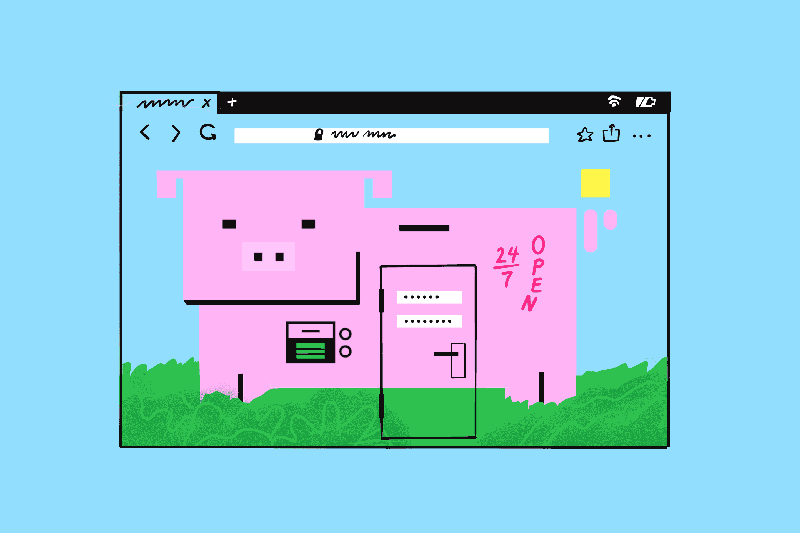I Was Skeptical of Online Banks — Until Experts Showed Me Their Money-Saving Potential

Welcome to Dollar Scholar, a personal finance newsletter written by a 27-year-old who’s still figuring it out: me.
Every week, I talk to experts about a money question I have, whether that’s “What if I don't have a 401(k)? or “How many credit cards do I need?” As I learn, I share simple ways to improve your financial life… and post cute dog photos.
This is (part of) the 17th issue. Check it out below, then subscribe to get future editions of Dollar Scholar every Wednesday.
Working at Money can be weird sometimes. Don't get me wrong, I love my coworkers — I just can't always relate to them because they're so much more financially savvy than me. Whereas I'm an expert on Instagram meme accounts, Riverdale plot points and Pete Davidson's dating history, they're fluent in Medicare plans, commission-free trades and Depression-era mutual funds.
(Yes, this is my polite way of saying they are nerds.)
Usually I can fake my way through conversations by mumbling "uh huh" and "well, you know, tariffs" a lot, but it's been difficult recently. For the past couple of weeks, everyone around my desk has been in a tizzy about our Best Banks rankings. Using a highly scientific process I had nothing to do with, they determined the best credit union, best CD, best high-yield checking account and so on. While I was excited that Taylor Swift's Tiny Desk Concert finally dropped, my coworkers were all hyped about crowning Ally the best online bank for the second year in a row.
(Like I said: nerds.)
I have no idea why this is a big deal. Like, what is an online bank? Are they sketchy? Should I get one?
For the answer, I went straight to the source: Anand Talwar, Ally's deposits and consumer strategy executive. Talwar told me, quite simply, that an online bank is... a bank... that's online. The only factor that sets it apart from a traditional one is the fact that it doesn't have branches IRL.
Other than that, Talwar said there's "no structural difference whatsoever." And it's actually a good thing.
"The huge benefit to banking with an online bank is that customers get a whole lot more in the overall value proposition than they would with a brick-and-mortar," he adds.
OK, let's break that down into normal-people terms. Basically, because online banks don't have to pay for infrastructure costs associated with running a regular bank — think electric bills and other maintenance — they can sweeten the pot for customers.
For example, they can decrease fees. Ally's overdraft fee is $25, whereas Wells Fargo's is $35.
They can also offer cool features, like 24/7 customer service, and high interest rates. Capital One 360's APY for online savings accounts is currently 1.9% compared to Bank of America's 0.03%.
Despite these sweet numbers, online banks still have to operate in legit ways. Talwar told me online banks are regulated entities with the same security standards as brick-and-mortar ones. Companies like Discover are part of the Federal Deposit Insurance Corporation, or FDIC, meaning customers' deposits are insured up to $250,000 per person per category just like they would be at my local branch.
Sounds great. But Talwar works for an online bank, so I thought maybe he was only seeing pros and no cons. I pressed him on what I can't do with an online bank, and he identified three things Ally does NOT do.
It doesn't accept cash deposits, it doesn't offer safety deposit boxes, and it doesn't have a notary. Also, no physical locations obviously means NO LOLLIPOPS.
And while we're talking downsides, it's worth noting that the sky-high interest rates many online banks are famous for are falling. As we learned in issue #2 of Dollar Scholar, that's because of market conditions. The Federal Reserve has been cutting its interest rates, leading companies like Ally and Marcus by Goldman Sachs to bring their own rates down.
Mary Kate Loftus, group vice president and head of digital banking at M&T Bank, identified another drawback: Online banks don't always offer the personalized relationships that community banks typically do.
"Many people feel more comfortable having a face-to-face conversation for financial decisions surrounding big life changes, examples [like] being [in] a new job, retirement planning or working through the financial impact following the death of a loved one," Loftus says.
As a result, she said an online bank can work well in combination with a traditional one. I could have my main checking account at Bank of America, for example, and a savings account with Ally. Loftus said it could be an easy way to diversify my financial plan.
The bottom line: Online banks aren't sketchy just because they're online. In fact, they may be a particularly attractive option for my savings, given their high(er-than-normal) interest rates.
Also, I don't have to interact with anyone, which is great for a millennial like me.
